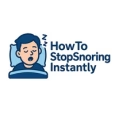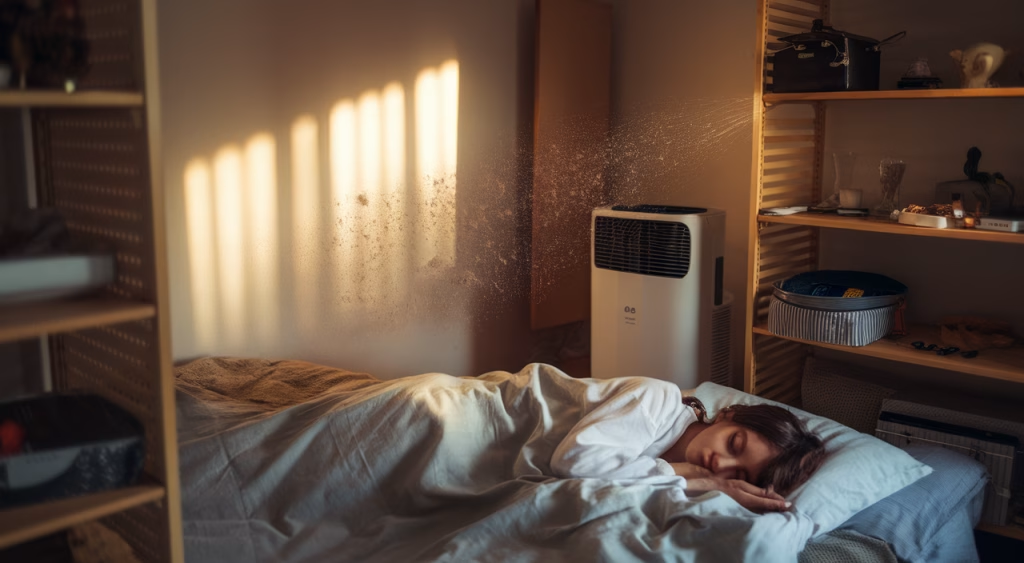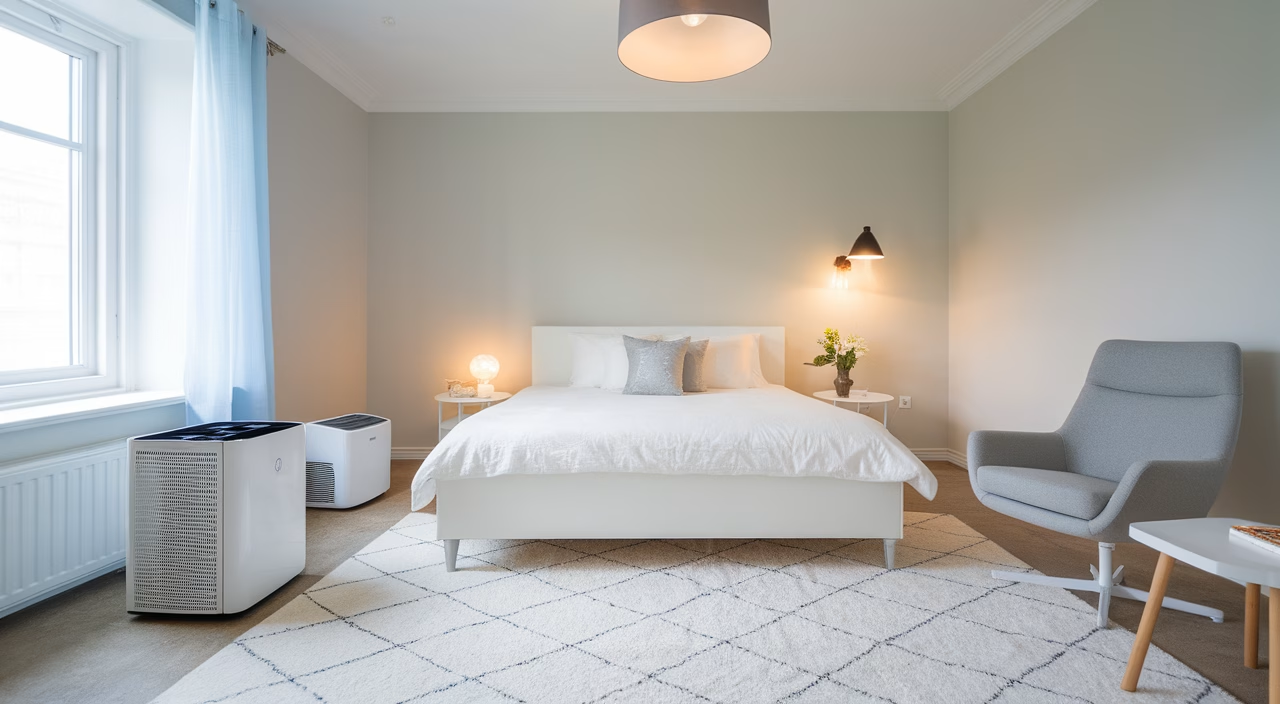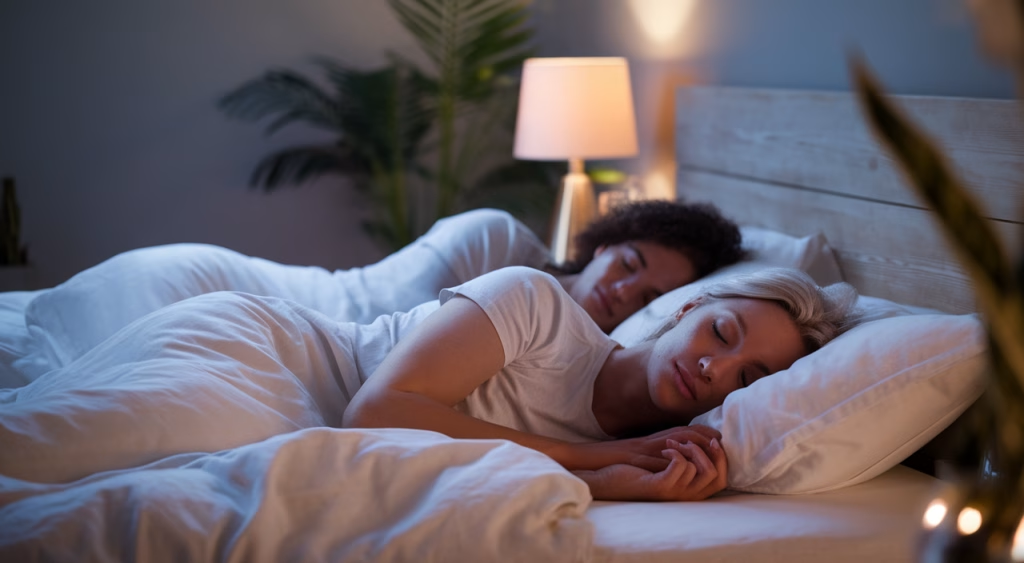Can Environmental Factors Really Cause You to Snore More?
Absolutely, and the connection is stronger than most people realize. Environmental factors affecting snoring—like poor air quality, excessive humidity, and allergen exposure—directly impact your respiratory pathways, making you snore louder and more frequently. Your bedroom environment could be the hidden culprit behind your restless nights.
TL;DR: Why Your Environment Could Be Making You Snore
- Environmental factors affecting snoring like dust, humidity, and pollutants inflame your airways and disrupt breathing patterns.
- Home dampness and snoring are closely linked—mold spores cause nasal irritation that worsens nighttime breathing.
- Air pollution and snoring connection occurs when pollutants narrow airways through respiratory inflammation.
- You can reduce snoring with environmental changes by improving indoor air quality and controlling humidity levels.
- Simple, affordable solutions exist to help you control environmental snoring triggers, even if other methods haven’t worked.
Understanding the Impact of Environmental Factors
Ever noticed your snoring gets worse in certain rooms—or during specific seasons? That’s no coincidence.
The air you breathe at night directly influences how well your airways function during sleep. Environmental factors affecting snoring include indoor air pollutants, temperature fluctuations, mold spores, and even chemicals from furniture or cleaning products. While anatomical factors matter, growing research reveals that where you sleep is just as crucial as how you sleep.
When you understand these environmental triggers, you can reduce snoring with environmental changes that target the root causes—not just the symptoms.
Home Dampness and Snoring: The Hidden Connection
Damp sleeping environments create perfect conditions for airway inflammation. Homes with poor ventilation, leaky pipes, or basement bedrooms are especially problematic. The relationship between home dampness and snoring occurs because excess moisture cultivates mold growth, and mold spores irritate your respiratory system—even if you don’t have diagnosed allergies.
Studies consistently show strong links between home dampness and snoring. Moist air traps allergens and irritating particles longer, increasing your exposure to substances that inflame nasal passages. This inflammation narrows your airways, creating the tissue vibrations we hear as snoring.
Here’s the typical progression: You sleep in a humid, musty room. Mold spores and damp air inflame your sinuses overnight. By morning, you’ve snored loudly for hours, leaving you and your partner exhausted.
Warning signs that home dampness and snoring are connected include:
- Window condensation, especially in bedrooms
- Persistent musty or earthy odors
- Visible black spots or water stains on walls
- Nasal congestion that improves when you leave the house
Air Pollution and Snoring: Why Clean Air Matters
The connection between air pollution and snoring affects millions, yet most people don’t realize their environment is sabotaging their sleep.
Outdoor pollutants like nitrogen dioxide, fine particles (PM2.5), and ozone infiltrate your home through windows, HVAC systems, and even on your clothing. These irritants trigger upper airway inflammation similar to allergic reactions. The result? Increased airway resistance during sleep, more frequent snoring episodes, and potentially sleep-disordered breathing.
If you live near busy roads, industrial areas, or in dense urban environments, air pollution and snoring may be directly linked in your case. Your respiratory system works overtime defending against microscopic pollutants, preventing the deep relaxation needed for quiet breathing.
Recent research demonstrates that poor air quality exposure correlates with increased snoring severity. People with existing respiratory conditions, children, and older adults experience the strongest effects when environmental factors affecting snoring include pollution.
Tips for Reducing Snoring Due to Environmental Factors
Ready to reduce snoring with environmental changes that actually work? These proven strategies can transform your sleep quality starting tonight:
1. Control Humidity Levels
Keep bedroom humidity between 30-50% to prevent mold growth and reduce airway inflammation. Use a digital hygrometer to monitor levels and invest in a quality dehumidifier for consistently damp areas like basements or bathrooms.
2. Improve Air Circulation
Fresh air circulation helps dilute indoor pollutants and allergens. Open windows during low-pollution hours (typically early morning or late evening). Install exhaust fans and use air purifiers with HEPA filters to trap particles before they reach your lungs.
3. Eliminate Indoor Toxins
Switch to non-toxic cleaning products and eliminate synthetic air fresheners or scented candles. These products release volatile organic compounds (VOCs) that irritate nasal passages and throat tissues, worsening snoring.
4. Upgrade Your Sleep Environment
Wash bedding in hot water weekly to eliminate dust mites. Choose hypoallergenic pillows and mattress covers. If you’re sensitive to allergens, avoid feather pillows which can harbor irritants.
5. Use HEPA Air Purifiers
High-quality air purifiers remove dust, smoke, pollen, and mold spores—addressing multiple environmental factors affecting snoring simultaneously. Place them in bedrooms for maximum benefit.
6. Monitor Seasonal Triggers
Spring and fall often bring increased allergen exposure. Keep windows closed on high-pollen days and shower before bed to remove allergens from hair and skin, reducing nighttime respiratory irritation.
Cost Guide: Environmental Snoring Solutions
| Solution | Low-End | Mid-Range | High-End |
|---|---|---|---|
| HEPA Air Purifier | $50 | $150 | $500+ |
| Dehumidifier | $75 | $200 | $600+ |
| Allergen-Proof Bedding | $30 | $90 | $250+ |
| Humidity Sensor (Hygrometer) | $10 | $25 | $60+ |
Conclusion: Taking Control of Your Sleep Quality
Your bedroom environment might be the primary cause of your snoring—but that’s actually encouraging news.
Unlike anatomical factors, environmental factors affecting snoring are controllable, fixable, and often surprisingly affordable to address.
Clean air, controlled humidity, mold prevention, and allergen-free bedding aren’t luxury upgrades—they’re essential for quality sleep. When you reduce snoring with environmental changes, you’re not just quieting your nights; you’re protecting your long-term respiratory health and preserving your relationships. Now that you understand how home dampness and snoring connect, and how air pollution and snoring interact, you have the knowledge to transform your sleep environment and reclaim peaceful nights.
Frequently Asked Questions
Why am I suddenly snoring so badly?
Sudden snoring changes often result from environmental factors affecting snoring, such as seasonal allergens, increased home humidity, or new pollutant sources in your sleeping area. Check for signs of mold, dust accumulation, or ventilation problems in your bedroom.
Can opening a window reduce snoring?
It depends on outdoor air quality. Fresh air helps when pollution levels are low, but high pollen or pollution can worsen environmental factors affecting snoring. Use air purifiers when outdoor air quality is poor.
Does indoor mold really cause snoring?
Yes, the connection between home dampness and snoring is well-documented. Mold spores irritate respiratory passages, causing inflammation that narrows airways and increases snoring frequency and intensity.
Will an air purifier stop my snoring?
Air purifiers can significantly help if environmental factors affecting snoring include dust, pollen, or pollution. HEPA filters remove common airborne irritants that inflame nasal passages and throat tissues.
How do I know if my bedroom is too humid?
Signs include window condensation, musty odors, or sticky air quality. Use a hygrometer to measure humidity—optimal levels stay between 30-50% to prevent the home dampness and snoring connection.
Can allergies make you snore more at night?
Absolutely. Allergic reactions swell nasal passages, forcing mouth breathing that increases snoring. Environmental allergens are major contributors to nighttime breathing problems.
Is snoring a sign of poor air quality?
Often, yes. The relationship between air pollution and snoring occurs when contaminated air inflames throat and nasal tissues, disrupting smooth airflow and creating the conditions for loud snoring.





